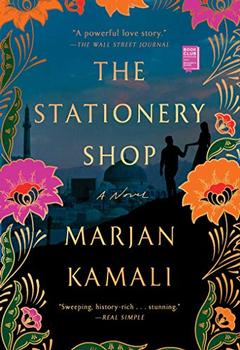Summary | Excerpt | Reading Guide | Reviews | Beyond the Book | Readalikes | Genres & Themes | Author Bio

A Novel
by Marjan Kamali
"I am good," she said. She'd learned to say that from Americans: I'm good, I'm fine, it's all okay, okey-dokey. Easy-peasy Americanisms. She knew how to do it. Her heart pounded, but she looked steadily at Claire.
Claire lowered her head and finally turned and walked out. The click-click of her heels as she left the room matched Roya's extra-loud heartbeat.
She could still follow Claire and leave this smelly place, catch up to Walter before he finished his lunch, go home, climb into bed, and pretend never to have made this strange miscalculation. It wasn't too late. She imagined Walter hunched over his ginger beer and lobster roll alone at that deli—poor thing. But no. She'd come here to finally find out.
One foot in front of the other, that was how you did it. She forced herself toward the wheelchair by the window. Her heels didn't click; she had on her trusty gray thick-soled shoes. Walter had insisted that she wear snow boots, but she had refused. She was willing to accept a lot of things, but seeing her old lover for the first time in sixty years while wearing fat Eskimo boots was one of the few things she could not accept.
The man was oblivious to her presence, as if she didn't exist.
"I've been waiting," a voice suddenly said in Farsi, and Roya's body buzzed. That voice had both energized and comforted her when they were inseparable.
It was 1953. It was summer. She was seventeen. New England melted away, and the cold outside and the false heat inside evaporated, and Roya's legs were tanned and toned, and they were standing, she and he, by the barricades, leaning onto the splintered wood, screaming at the top of their lungs. The crowd billowed, the sun burned her scalp, two long braids ended at her breasts, her Peter Pan collar was soaked in sweat. All around them, people pumped their fists and cried as one. Anticipation, the knowing of something new and better about to arrive, the certainty that she would be his in a free, democratic Iran—it was all theirs. They had owned a future and a fate, engaged in a country on the verge of a bold beginning. She had loved him with the force of a blast. It had been impossible to imagine a future in which she didn't hear his voice every day.
On the linoleum, Roya saw her feet, suddenly unrecognizable to her—in gray little-old-lady shoes with thick soles and tiny bows on top.
The man wheeled his chair around and his face broke into a smile. He looked tired; his lips were dry and deep lines scored his forehead. But his eyes were joyful and filled with hope.
"I've been waiting," he repeated.
Was it possible to slip so easily back? His voice was the same. It was him, all of it, the eyes, the voice, her Bahman.
But then she remembered why she had come. "I see." Her voice came out much stronger than she'd expected. "But all I've wanted to ask you is why on earth didn't you wait last time?"
She sank into the chair next to him, as tired as she'd ever been in all her years on earth. She was seventy-seven and exhausted. But as she remembered that cruel, disillusioning summer from which she'd never fully recovered, she felt as if she were still seventeen.
Excerpted from The Stationery Shop by Marjan Kamali. Copyright © 2019 by Marjan Kamali. Excerpted by permission of Gallery Books. All rights reserved. No part of this excerpt may be reproduced or reprinted without permission in writing from the publisher.
A library, to modify the famous metaphor of Socrates, should be the delivery room for the birth of ideas--a place ...
Click Here to find out who said this, as well as discovering other famous literary quotes!
Your guide toexceptional books
BookBrowse seeks out and recommends the best in contemporary fiction and nonfiction—books that not only engage and entertain but also deepen our understanding of ourselves and the world around us.